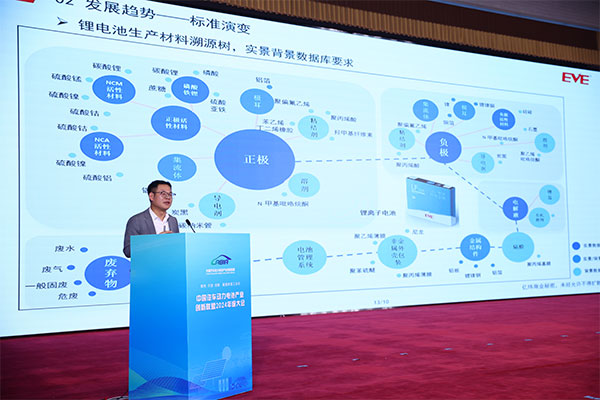On May 30, the China Automotive Battery Innovation Alliance Annual Conference 2024 was held in Beijing. EVE Energy won two awards, "Top 20 Enterprises with Outstanding Contributions to the Industry" and "Top 20 Enterprises with the Most Growth Potential". Dr. Xiao Zhongxiang, Director of the Dual Carbon Work Department of EVE Energy, was invited to attend the conference and deliver an important speech.
 The lists are publicly selected by the Ministry of Industry and Information Technology and the China Automotive Battery Innovation Alliance. With its continuous innovation capabilities and excellent market performance in the battery field, EVE Energy stands out from many outstanding companies and is named to two Top 20 lists.
The lists are publicly selected by the Ministry of Industry and Information Technology and the China Automotive Battery Innovation Alliance. With its continuous innovation capabilities and excellent market performance in the battery field, EVE Energy stands out from many outstanding companies and is named to two Top 20 lists.
At the meeting, Dr. Xiao Zhongxiang delivered a keynote speech on "Battery Carbon Footprint Accounting and Management" based on the background, trends, responses and prospects of carbon footprint management. He pointed out that in recent years, the export of photovoltaics, lithium batteries and new energy vehicles has continuously increased, and export trade has ushered in a new chapter. It's the good news but also with a worry that the EU new battery regulation continues to strengthen supervision, requiring companies to provide real-life datas such as supply chain carbon emissions, raw material traceability and others. Carbon footprint is becoming a key "threshold" indicator for exports, and corporate carbon footprint management has become an extremely important issue.
 Subsequently, Dr. Xiao Zhongxiang summarized the four major trends in carbon footprint management. First, the threshold of carbon footprint management is gradually raised, it has become one of the most important issues for enterprises. The industry must guard against hegemony in rule-making and auditing, and pay attention to data security, technical security and strategic security. Secondly, the objects of carbon footprint management are broadened from local to overall, enterprises need to achieve full coverage of green management of core supply chains. Thirdly, management motivation shifts from policy-driven to proactive layout, requiring enterprises to actively green transformation. In terms of management requirements, carbon footprint management is going deeper, not only focusing on carbon emissions reduction, but also emphasizes the actual contribution of enterprises to society. Finally, the approach of carbon footprint management is gradually changing from closed to public, and enterprises need to establish a more transparent management system.
Subsequently, Dr. Xiao Zhongxiang summarized the four major trends in carbon footprint management. First, the threshold of carbon footprint management is gradually raised, it has become one of the most important issues for enterprises. The industry must guard against hegemony in rule-making and auditing, and pay attention to data security, technical security and strategic security. Secondly, the objects of carbon footprint management are broadened from local to overall, enterprises need to achieve full coverage of green management of core supply chains. Thirdly, management motivation shifts from policy-driven to proactive layout, requiring enterprises to actively green transformation. In terms of management requirements, carbon footprint management is going deeper, not only focusing on carbon emissions reduction, but also emphasizes the actual contribution of enterprises to society. Finally, the approach of carbon footprint management is gradually changing from closed to public, and enterprises need to establish a more transparent management system.
As the core component of new energy vehicles, battery carbon footprint management is particularly important. EVE Energy is taking active actions and proposing the CREATE carbon neutrality action plan, starting from six dimensions: carbon footprint management, recycling, extreme manufacturing, assurance internal and external audits, technological innovation and energy transformation, and is committed to achieving operational carbon neutrality in 2030, to achieve carbon neutrality in the core value chain by 2040. To this end, the company is establishing carbon footprint tools and databases, exploring the use of innovative technologies such as blockchain and the Internet of Things, and efficiently and accurately monitoring battery supply chain carbon emissions through traceability systems.
Finally, Dr. Xiao Zhongxiang advocated that the entire industry adopt staged and full-chain carbon footprint management measures, with dual carbon as the goal, work together to promote the low-carbon development of the battery industry and jointly pursue sustainable development!













